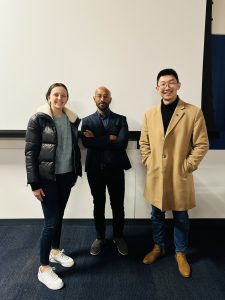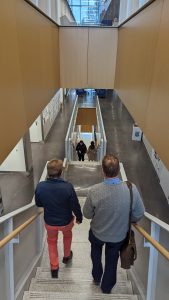
Dr. Nathan Crook received his B.S. in Chemical Engineering from the California Institute of Technology in 2009, and his Ph.D. in Chemical Engineering from the University of Texas at Austin in 2014, studying under Dr. Hal Alper. He pursued postdoctoral studies in Pathology and Immunology at Washington University in Saint Louis School Medicine from 2014-2017 in the lab of Dr. Gautam Dantas. Dr. Crook joined the department of Chemical and Biomolecular Engineering at NCSU in January 2018, and his lab focuses on how to engineer microbial communities. He received an NSF CAREER award and NIH New Innovator Award in 2023, and mentors 10 amazing graduate students and 3 amazing postdocs.
Abstract: The large intestine is the site of many human diseases yet is difficult to access with orally- or intravenously delivered drugs. At the same time, the gut provides a habitat for a numerous and diverse population of microbes (viral, prokaryotic, and eukaryotic) that perform important, health-relevant chemistries using host- and diet-derived carbohydrates as a feedstock. Therefore, there has been a rising interest in genetically engineering these gut microbes to produce therapeutic molecules in the gut, ultimately improving drug delivery and reducing drug costs. Saccharomyces boulardii (Sb) is a widely used yeast probiotic, demonstrating effectiveness against various gastrointestinal disorders.
As a yeast, Sb exhibits high rates of protein secretion, is tolerant to low pH, can be freeze-dried, and low (if any) rates of horizontal gene transfer. Sb is therefore a promising chassis for development of personalized engineered probiotic medicines. In this talk, I will discuss our lab’s recent progress in tuning four key parameters of Sb’s efficacy as a drug delivery vehicle. First, I will present the development of a constitutive Sb promoter library, and how we applied this library to synthesize β-carotene in the mouse gut. Then, I will introduce how sensing of extracellular metabolites may be achieved through repair of Sb’s defective mating pathway and the expression of human adenosine and melatonin G protein-coupled receptors. I will next detail our efforts to enhance Sb’s in vivo residence time through both rational and screening-based approaches.
Finally, I will discuss some new work from our lab focusing on the engineering and optimization of protein secretion titers in Sb, culminating in a quadruple knockout strain with a 10-fold increase to recombinant peptide production. Taken together, this work establishes Sb as a genetically tractable commensal fungus and demonstrates the tunable delivery of small-molecule and protein therapeutics during colonization.















